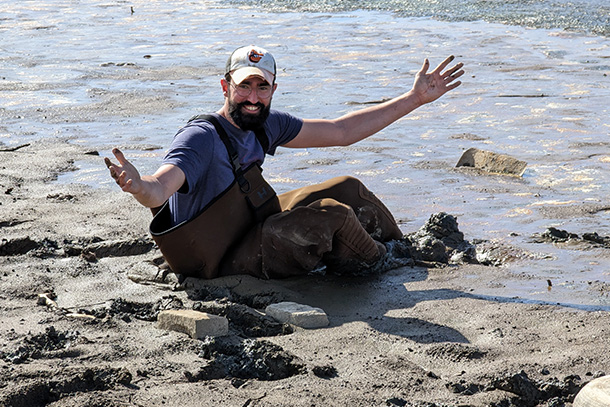Student Spotlight
Kyle Dalton
Fourth-year Doctoral Candidate

Why did you choose Penn State?
The four Fs of grad school: faculty, facilities, funding, and fun. There are a lot of great schools out there, but for me, Penn State offered the best combination of the Fs. I wasn't able to tour Penn State before coming here (thanks covid), but I got to meet many of the Acoustics faculty via a Zoom call to talk about the interesting, challenging problems they're pursuing. I was really impressed by the breadth of expertise within the program. Through that meeting, I got set up with a lab group I really liked that had the lab space, specialized equipment, technical expertise, and financial support to help me go after a Ph.D. To top it all off, I really like the State College area. There are a lot of fun things to do outside of the lab!
What made acoustics the right engineering discipline for you?
Acoustics brings together my musical and technical interests. I studied electrical engineering and computer engineering in undergrad. I've played some type of musical instrument pretty much my entire life, and I like to design and build audio electronics projects in my free time. After college, I worked for the U.S. Navy for two years, which sparked my interest in underwater acoustics. So, when I decided to go to grad school, acoustics seemed like a good fit.
Can you briefly describe your research and why it appealed to you?
My research uses sonar (underwater sound) to find underwater unexploded ordnance (bombs that didn't go boom) at old military testing and training sites. These ordnance can be really hard to find as they may become buried over time and can look a lot like rocks and other natural debris. Many of these old military sites are transitioning to civilian use, so we need to make sure any ordnance is dealt with before the site becomes a recreational area or nature preserve. I work with a combination of acoustics, signal processing, and machine learning make unexploded ordnance easier for humans and computers to find. I've always preferred applied research over theoretical research, so being able to apply my work to an active, real-world problem was really appealing to me. I also enjoy being part of an environmental clean-up effort.
What have you enjoyed most about being part of Acoustics since starting at Penn State?
The people. Members of the program are from all over the world, with a wide assortment of backgrounds, interests, and skills. Many of my new friends since starting grad school are members of the acoustics program. My advisors have helped me grow as a researcher, and the acoustics department staff are incredible.
What advice would you give someone considering the Acoustics program at Penn State?
There's no "right" or "wrong" way to get into acoustics. Some members of the program have backgrounds in math, physics, and engineering, while others went to music school or have experience in stage production and sound design. Very few students come into the program with a formal acoustics class on their transcript. In my opinion, your ability to learn new skills, to communicate effectively, and to apply your existing expertise to new problems is way more important than what you may have studied before coming to Penn State.
Acoustics is a lot more than just music. While many acousticians have some sort of musical interest or background, it's absolutely not a prerequisite. Don't be intimidated if music isn't your thing.
Talk to us! If you have any questions, feel free to reach out to the program or to an acoustics student.
Have you received any awards during your time at Penn State? If so, what awards?
I've received the Acoustical Society of America Spring 2022 Student Paper Award, 2023 Kenneth T. Simowitz Memorial Citation, and 2023-2024 Tindal Graduate Award.
Are you involved in any student organizations? If so, which organizations, what role(s) do you hold, and why did you choose those organizations?
I am an active member of the Penn State Disc Golf Club, and I play on our competitive team. We won multiple tournaments last year, including our conference championship, and competed at the College Disc Golf National Championship. I got into disc golf just before Covid, and knew I wanted to keep playing when I moved up here for grad school. Joining the club has been a great chance to meet people outside of acoustics, play a lot of disc golf, and decompress from classes and research.
I also lead a sonar design project with Penn State's local chapter of the Acoustical Society of America. We're building a sonar from scratch using consumer audio equipment (speakers and microphones) for students to use in their research and extracurricular activities. My lab group uses a similar sonar for our research, so I wanted to build one that is accessible to the whole department. We hope that this system can complement the existing classes and experiments in the acoustics curriculum.
How have you been impacted by your graduate experiences at Penn State?
Penn State acoustics has helped me make a ton of connections in my field. When I go to conferences, pretty much everyone I talk to has some sort of association to the acoustics department. Many of the hiring managers I've met have either studied acoustics at Penn State themselves or currently work with Penn State alumni. I think my classmates have had a pretty big impact on me too. I was a groomsman in one of my classmates' wedding last fall and have formed friendships that will last well beyond my time in this program.
What impact do you hope to make after you leave Penn State?
My go-to answer for this type of question is always "use sonar to find the Loch Ness Monster." But on a more serious note, I'd like to apply the things I've learned at Penn State to the challenging problems in mapping, navigating, and investigating underwater environments. For example, we have high-quality photos of Pluto but lack detailed imagery of large parts of our own ocean floor—which is just crazy to me! I'd also like to make an impact through teaching acoustics, specifically underwater acoustics and signal processing. If I don't find the Loch Ness Monster, hopefully a future student of mine will.
What do you enjoy most about living in the Happy Valley area?
Most of my hobbies take me outdoors, so probably the surrounding nature and the accessibility of outdoor recreation. If you like to hike, backpack, kayak, ski, climb, fish, bird watch, etc., there's probably a place to do it in Happy Valley.


